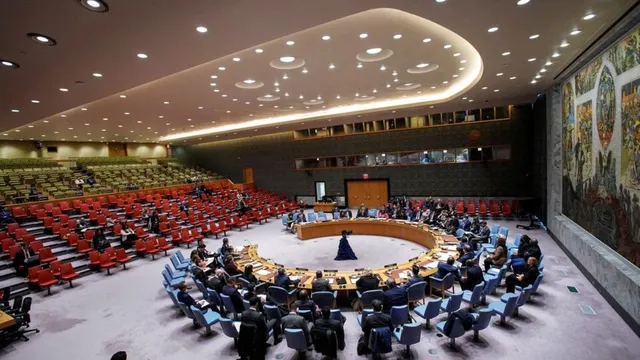- By Supratik Das
- Mon, 05 May 2025 08:27 AM (IST)
- Source:JND
The United Nations Security Council (UNSC) is set to meet in a high-level session today to address the rising tension between India and Pakistan following the Pahalgam terror attack on April 22, which killed 26 civilians. The meeting comes amid rising tension between the two nuclear-armed neighbours. The attack in the Baisaran valley drew widespread condemnation. The UN Security Council (UNSC) had also strongly condemned the attack in Jammu and Kashmir "in the strongest terms."Today's session is likely to be an opportunity for both India and Pakistan to present their respective positions before the international community.
Speaking before the session, Greece's Permanent Representative to the United Nations and President of the Security Council at present, Ambassador Evangelos Sekeris, stated, “This is a position of principle. We condemn terrorism in all its forms, everywhere it is happening. On the other hand, we are concerned about this tension, which is mounting in the region.”
Pakistan To Bring On Agenda
Pakistan's Ministry of Foreign Affairs announced on Sunday that it would formally inform the UNSC about "India's aggressive actions, provocations, and provocative statements." Foreign Minister Ishaq Dar instructed Pakistan’s Permanent Representative to the UN, Ambassador Asim Iftikhar, to immediately engage the Security Council and seek international attention on New Delhi’s recent decisions, particularly the suspension of the Indus Waters Treaty. “This important diplomatic move is part of Pakistan’s efforts to present accurate facts to the international community,” a statement from the Foreign Office read.
India has blamed Pakistan-based extremist outfits for masterminding the attack. After the Pahalgam terror attack, India retaliated with a series of firm diplomatic and economic measures. These included the expulsion of Pakistani military attaches from New Delhi, suspension of the Indus Waters Treaty, and closure of the Attari-Wagah which is a crucial link for cross-border movement and trade. In a counter move, Pakistan closed its airspace to Indian carriers and suspended all forms of trade with India, including third-party routes. Islamabad also rejected New Delhi’s decision to suspend the Indus Waters Treaty, warning that any attempt to halt the pact would be seen as an “act of war.”

